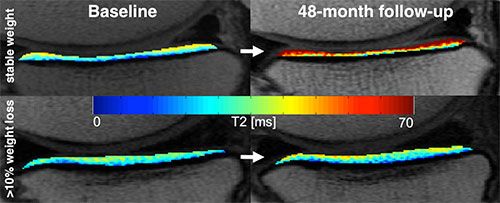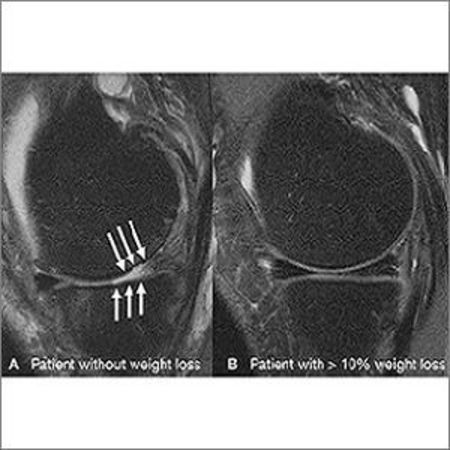Weight loss can help to slow the degeneration of knee cartilage for obese people, according to a new MRI study presented at the annual meeting of the Radiological Society of North America (RSNA). Researchers say that substantial weight loss can also reduce the risk of developing osteoarthritis.
Obesity is a major risk factor for osteoarthritis, a degenerative joint disease that affects more than a third of adults over the age of 60, according to the Centers for Disease Control and Prevention. The knee joint is a common site of osteoarthritis, and in many people the condition progresses until total knee replacement becomes necessary.
Alexandra Gersing, MD, Department of Radiology and Biomedical Imaging at the University of California, San Francisco, and co-authors studied the association of different degrees of weight loss with progression of knee cartilage degeneration in overweight and obese subjects. Their study included 506 overweight and obese patients from the Osteoarthritis Initiative, a nationwide research study focused on the prevention and treatment of knee osteoarthritis.
Participants either had mild to moderate osteoarthritis or risk factors for the disease. They were divided into three groups: a control group who did not lose weight, a second group who lost a little weight, and a third group who lost more than 10 percent of their body weight. The research team then used MRI to quantify knee osteoarthritis. "Through T2 relaxation time measurements from MRI, we can see changes in cartilage quality at a very early stage, even before it breaks down," Dr. Gersing noted.
The team analysed data for differences in the quality of cartilage among the three groups over a four-year time span. They found evidence that weight loss has a protective effect against cartilage degeneration and that a larger amount of weight loss is more beneficial. Cartilage degenerated at a much slower rate in the group that lost more than 10 percent of their body weight, particularly in the weight-bearing regions of the knee, Dr. Gersing explained. "However, those with 5 to 10 percent weight loss had almost no difference in cartilage degeneration compared to those who didn't lose weight."
Dr. Gersing's group is looking to investigate the role of diabetes, which is closely linked with obesity, in cartilage degeneration. They also plan to do an eight-year follow-up with the patient group and look at what effects weight gain may have on the knee joint.
Top image. Knee joint of patient without weight loss (A) showing severe cartilage defects after 48 months, whereas in the knee joint of a patient with a substantial amount of weight loss (B), cartilage remains intact.

Figure 1. Cartilage T2 maps indicating worsening cartilage quality (red) after 48 months in an obese patient without weight loss (top row) compared to a patient with >10% weight loss (bottom row) in which only little cartilage degeneration is found.
When and Where
Dr. Gersing presents “Weight Loss Is Associated with Slower Cartilage Degeneration Over 48 Months in Obese and Overweight Subjects: Data from the Osteoarthritis Initiative” on Monday 30 November, 10.50-11.00, in the session ISP: Musculoskeletal (Cartilage: Mechanics, Quantitative MRI and Repair) Room E450B, Lakeside Level 4.
Carine Khoury
Web Editor, HealthManagement.org
Source and image credit: RSNA
Obesity is a major risk factor for osteoarthritis, a degenerative joint disease that affects more than a third of adults over the age of 60, according to the Centers for Disease Control and Prevention. The knee joint is a common site of osteoarthritis, and in many people the condition progresses until total knee replacement becomes necessary.
Alexandra Gersing, MD, Department of Radiology and Biomedical Imaging at the University of California, San Francisco, and co-authors studied the association of different degrees of weight loss with progression of knee cartilage degeneration in overweight and obese subjects. Their study included 506 overweight and obese patients from the Osteoarthritis Initiative, a nationwide research study focused on the prevention and treatment of knee osteoarthritis.
Participants either had mild to moderate osteoarthritis or risk factors for the disease. They were divided into three groups: a control group who did not lose weight, a second group who lost a little weight, and a third group who lost more than 10 percent of their body weight. The research team then used MRI to quantify knee osteoarthritis. "Through T2 relaxation time measurements from MRI, we can see changes in cartilage quality at a very early stage, even before it breaks down," Dr. Gersing noted.
The team analysed data for differences in the quality of cartilage among the three groups over a four-year time span. They found evidence that weight loss has a protective effect against cartilage degeneration and that a larger amount of weight loss is more beneficial. Cartilage degenerated at a much slower rate in the group that lost more than 10 percent of their body weight, particularly in the weight-bearing regions of the knee, Dr. Gersing explained. "However, those with 5 to 10 percent weight loss had almost no difference in cartilage degeneration compared to those who didn't lose weight."
Dr. Gersing's group is looking to investigate the role of diabetes, which is closely linked with obesity, in cartilage degeneration. They also plan to do an eight-year follow-up with the patient group and look at what effects weight gain may have on the knee joint.
Top image. Knee joint of patient without weight loss (A) showing severe cartilage defects after 48 months, whereas in the knee joint of a patient with a substantial amount of weight loss (B), cartilage remains intact.

Figure 1. Cartilage T2 maps indicating worsening cartilage quality (red) after 48 months in an obese patient without weight loss (top row) compared to a patient with >10% weight loss (bottom row) in which only little cartilage degeneration is found.
When and Where
Dr. Gersing presents “Weight Loss Is Associated with Slower Cartilage Degeneration Over 48 Months in Obese and Overweight Subjects: Data from the Osteoarthritis Initiative” on Monday 30 November, 10.50-11.00, in the session ISP: Musculoskeletal (Cartilage: Mechanics, Quantitative MRI and Repair) Room E450B, Lakeside Level 4.
Carine Khoury
Web Editor, HealthManagement.org
Source and image credit: RSNA
Latest Articles
healthmanagement, #RSNA15, RSNA 2015, obesity, weight loss, osteoarthritis, knee cartilage
Weight loss can help to slow the degeneration of knee cartilage for obese people, according to a new MRI study presented at the annual meeting of the Radiological Society of North America (RSNA). Researchers say that substantial weight loss can also red



























